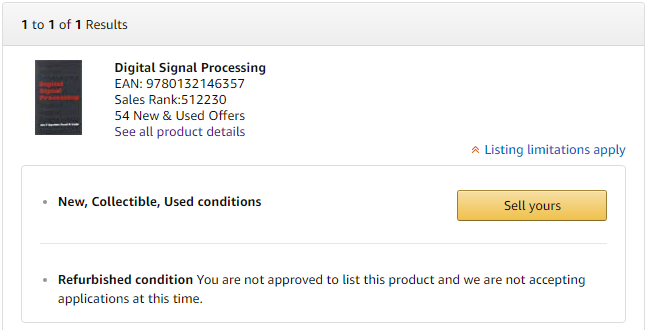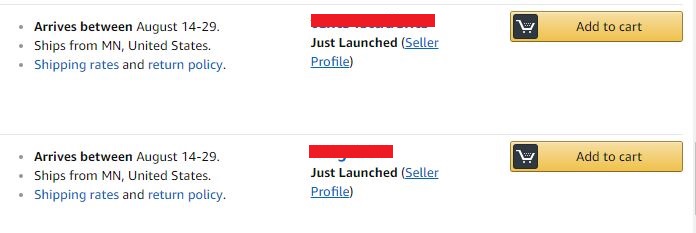Things To Avoid When You Are Sourcing Books Online To Re-sell
Mistakes are very common when we are trying to start something new. Without much experience in anything we do, we are open and liable to commit some errors along the way as we strive to master new talents and expertise.
Mistakes can be costly sometimes and can even cause us to give up on some things we do. Some of us hate to make mistakes because we believe making a mistake is going down in our investments. Investments like time and money, which we do not have in abundance but in limited supply.
The reason why many people fail today is that they turn to look for successes and pay less attention to the road that led to success. If we can change our focus to instead look out for the mistakes made every day in any field, then I believe we can minimize failures.
Learning from mistakes keeps you prepared for the rainy days. You will be aware of every hurdle you can encounter on the way and avoid them. Isn’t it an excellent way to go about learning something new?
Once you look out for the mistakes others have made, you are getting free information someone else already paid for. You can imagine how much you can save or avoid for not making the same mistakes others have already made.
In this case, sourcing books,
I am going to give you the mistakes you need to avoid when sourcing books online for re-sell.
I have made my share of these mistakes, and it kept me at a slow pace with growing my book business. You don’t need to make the same mistakes, but you can avoid these mistakes to drive your business for growth.
Now, let’s look at some mistakes to avoid when sourcing books on Amazon.
Much priority and emphasis have been placed on Amazon online sourcing, as I believe it is one of the best places to source books online. Some of the points can be applied to other online sourcing platforms one way or another.
1) Buying Textbooks Online During Textbooks Season.
Many new sellers made this mistake, including me. Avoid buying textbooks during textbooks season unless they are selling at the right price. During textbook seasons, prices are very high because there is an increase in demand for textbooks, and you will be missing the number one rule of this business “buy low and sell high.”
If you do make this mistake, you will be left with highly-priced textbooks in your Inventory even when the textbook season is over. The reason being, textbooks prices will turn to drop after textbook seasons, and you won’t stand a chance to compete in any way. Then all you will need to do is open your arms and ready to give a “hug” to the LTSF (Long Term Storage Fees).
2) Buying Books without Checking If You Can Sell Them or Not
Before you buy any book and especially via online arbitrage, always remember to check if you are allowed to sell the book on Amazon. Amazon has restrictions on some books, especially as a beginner seller. There are certain books you can apply to sell on Amazon, and sometimes applications are not accepted for some periods.
Without checking if you can sell a book or not before purchasing can leave you very angry after making a purchase, probably, of a very expensive book and realizing later you are not allowed to sell the book on Amazon.
Before purchasing a book, go into your seller central account, Inventory, add a new product, key in the ISBN and try to add or create a new listing for the book into your Inventory. Taking the aforementioned steps will help you to know if you are restricted from selling a book or not.
As a beginner, you will have some limitations, but as you start selling, Amazon will remove the limitations. Make sure you see something like this;

From the above example, you can sell this book as it allows us to sell the used condition, which is our prime focus. In some other cases, it will indicate if listing limitations apply.
Make sure you undertake this practice for every book you are trying to purchase online to sell on Amazon. If you are already selling a book, then you might not need to go through the process since you already have the books listed.
3) Failing to Read the Complete Listing Condition Note Before Purchasing A Book
Many buyers forget to read the complete listing of a book, which is very important when buying books online. Some sellers will try their best to hide issues or problems that will limit the sale of a book when describing the book.
They usually do this at the very end of their condition note because they know there are buyers out there like you who don’t take time to read the complete description note. It is common practice with eBay sellers. You might face some issues like water-damaged books, Instructor edition, library copies, and international edition.
Well, some buyers won’t worry much if they miss some of the details because they are probably buying the book for personal use. But, it is always important to remember this is a business for you, and you are buying a book to re-sell.
Always remember to click on the “Read More” link in other to read the full listing description. You can always return a book with Amazon, but you will be busy keeping your money in transit, which slows down your business progress.
4) Not Considering the Used Offer Count (UOC) when purchasing a book online.
The “use offer count” tells you the available amount of used offer available for a book. The “user offer count” might not be a crucial factor when deciding to purchase a book, but it can quickly tell you if you will be facing competition or not.
A book with a less “use offer count” indicates there won’t be too much competition, and a book with a high used offer count indicates there is more room for other online arbitrage buyers to purchase the book, thereby increasing the possibility for competition.
Also, the lower the “used offer count” can indirectly mean a book is getting scarce. Which means they might be a possibility to charge a higher price.
5) Buying Books Above The Average Price.
When sourcing online, always check the average price of a book and make sure you are not paying the price above the average price. The average price is the mid-point for which the price can either go up or down.
The average price of a book is always indicated for the last three months and up to the last six months (on Amazon). Buying a book above the average price will limit your ability to compete as you are purchasing the book at a higher price, whereas there is a possibility for the price to go below average.
When you buy a book below the average price, then you can be sure it is a good price to settle for given the rate of price change during that period. In this case, you can stay competitive at all times.
6) Ignoring The Customer Review Of A Book.
It is also essential to check the feedback or customer review of a book before buying it. The customer review tells you if people or readers actually like the book, and if the book is an excellent book to read.
We live in a world today where we can only make a buying decision by judging from another potential user’s experience. Amazon makes it easy as customers or buyers of a specific book can rate the book closer to a “1 star” indicating a poor review and a “5 star” indicating a good review.
I will never buy a book below “4 stars” as buyers may be slow in making a buying decision or having some second thoughts due to the reviews about the book. Imagine stocking a book with a 1 or 2 stars review rating. Potential buyers will show up at your store but keep on searching for a much better alternative with a good review rating.

From the above example, 329 buyers can’t be wrong. This means a buyer will be comfortable buying this book just by looking at the customer reviews about the book.
7) Failing To Check Where The Book Is Coming From.
When sourcing online, it is crucial to know where a book you are trying to buy is coming from. The Amazon marketplace is packed with international sellers from countries like the United Kingdom, India, China, and many more.
It can be very crucial when it comes to textbooks and delivery time. Receiving textbooks from international sellers to sell to students in the United States is not a very practical idea. The book can either be an international edition or, most likely, a counterfeit.
8) Buying Books From A “Just Launched” Seller.
We all started as a “just launch” seller, but the advantage with FBA is we have gone through a screening process and submitted valid documents to Amazon to avoid illegitimacy. As prime sellers, Amazon already has the book in their Inventory, so the chances of us not meeting up to the bargain of the sale is almost zero.
But when sourcing books online to re-sell on Amazon, try your best to avoid just launch sellers. You might end up not receiving the item you purchased. There are a lot of fake accounts out there ready to reap you off. I look at sellers with at least 1000 feedbacks and not below 90% positive. When I am very aggressive, you must have at least 2000 feedbacks and not below 95% positive rate.
Buyers with high positive ranking have been in the business for some time, and they know what they are doing. It reflects good customer service, which is just what I am looking for in other to make my buying decision. Paying attention to the kind of sellers you buy from will save you a lot of time from receiving the wrong books, books not as described, international edition, counterfeits and instructors edition.

9) Failing To Understand Books Sales Rank
It is very important to understand the sales rank of books because that is an essential factor to consider when sourcing books. Sales rank determines how fast a book can sell or how often a book is bought. Books with the best sales ranking (BSR) are the books you will be going for. Many booksellers fail to understand the concept of sales rank.
A sales rank close to 1 is considered a high ranking book, which means, the said book sells very fast. A low ranking book implies the book sells very slowly and indicated with a high numerical value of over millions.
For example, books with sales rank around the neighborhood of hundreds to thousands are fast movers.
Books around the sales rank of millions will sell very slowly. Also of importance is to check for the historical sales rank (HSR) rather than just the current sales rank (CSR). It will help you understand if a book is selling all through the year or just for a particular period. It will also help you to determine if a book is a textbook or just an ordinary book.
As a beginner, you need to be very competitive, and my advice is only to buy books with 400,000 AVR Sales Rank. This should be a stringent rule if you want to grow and succeed in your book business.
Here is a table to understand sales rank much better. These are just estimated values and not very accurate.
Sales Rank from
100,000 – 300,000 (At least a copy was sold a day ago)
300,000 – 500,000 (At least a copy was sold 3 days ago)
500,000 – 650,000 (At least a copy was sold 5 days ago)
650,000 – 800,000 (At least a copy was sold 7 days ago)
800,000 – 1000,000 (At least a copy was sold 10 days ago)
1000,000 – 1,200,000 (At least a copy was sold 15 days ago)
1,200,000 – 1,500,000 (At least a copy was sold 25 days ago)
2,500,000 – 3,000,000 (At least a copy was sold 40 days ago)
10) Buying “Acceptable” Conditions Books.
It is not a very practical idea to buy acceptable condition books to re-sell in Amazon. Buyers will only look at your offer if you are just the last option they have, and with starting a new business, you want to be the most attractive in price, quality, and even customer service.
Your Inventory should be full of “good” and “very good” books.
However, we sometimes purchase good quality books but end up receiving a copy which is below standard or not close to what it was described, which you can only list as “Acceptable.” But you shouldn’t worry much about this as you can always return the books and file for a refund.
Remember to always go for the best copies, especially when you are starting as a new bookseller on Amazon.
On the other hand, some reputable booksellers will “under-promise” and “over-deliver.” What I mean is you can find sellers who will list a book as “Acceptable” and deliver a “Good” condition book. Well, this might not be the case all the time.
11) Buying Books Published More Than 10 Years Ago.
Books are being published every day, and every single day new editions of books are being introduced. I am not trying to say old books don’t sell anymore, but some will drop in sales as new editions keep coming out. If you are a new seller, I can advise you even go for books not more than six years old. Such books will sell fast.
It is is very common with textbooks. Fiction books can sell for a long time, but remember, let the market tell you that by interpreting the charts and looking at the sales rank.
12) Get A Mentor
Getting a mentor to guide you is very important in anything you do. Mentors have already made the mistakes for you, and they will guide you to succeed even faster than you would have just by yourself. It is very important to pick a successful mentor to guide you through your journey than someone who is unsuccessful, for I wonder what such as individual will mentor you on.
If you can’t afford one on one training, you can get free training on Youtube and many other free learning platforms
13) Finally, after considering all of the above mistakes, it is very important to consider if a book can sell?
How fast can the book sell? Can you be the first FBA listing with your price? What position would you feel comfortable listing your book at? Who are the other sellers? What conditions are your competitors’ books? How many copies do they have in stock if you plan to price below?
Is Amazon having a warehouse deal below the price you are willing to sell your copy for? Is there a huge gap in price between Amazon, new offers, and your selling price? Answers to these questions will affect your buying decisions as you source for books to sell on Amazon. The right answers to these questions will leave you with the best buying decisions.
EndNotes
Mistakes can enhance our experience if we learn to accept mistakes. Avoiding mistakes can save you time, energy, and money. If you can not repeat these mistakes, you are literally 13 steps ahead in your book business.
Another mistake you can make is to limit yourself only to these 13 mistakes I have listed here. You need to go out there and look out for other mistakes booksellers are making and always stay ahead. If you have experienced some mistakes, please, leave a comment below to help us not to make the same mistakes.
This should not only be with your book business. Try to look for mistakes in everything you are doing or plan to do. It will always keep you ahead and prepared.


Recent Comments